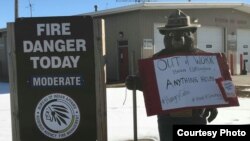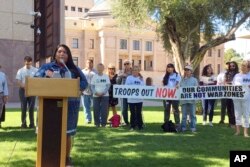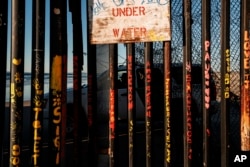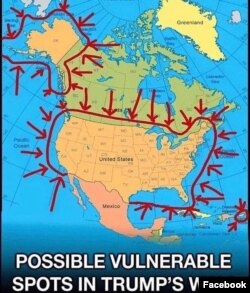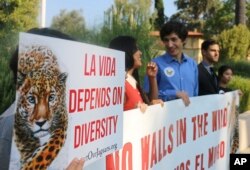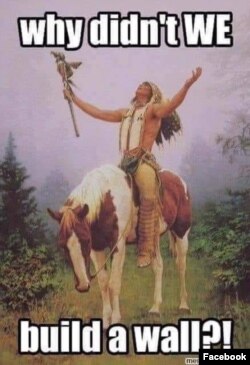Native Americans, like other Americans, are deeply divided over the proposed border wall that President Donald Trump says will stop the flow of drugs and criminals across the border with Mexico. They also have mixed responses to the partial U.S. government shutdown, which began Dec. 22.
Federally recognized tribes depend on federal dollars for food and housing aid, health care, public safety and other services. The shutdown has cut off that funding, forcing tribal administrative offices to close or lay off staff. The National Congress of American Indians said the lapse is a violation of U.S. treaty and trust responsibilities to tribal nations.
Feeling the pinch
"Politics aside, there are a lot of families that reside on this reservation who depend on that [federal] income to provide for their families," said Stephanie Brady Fisher, a member of the Northern Cheyenne tribe in Montana. "Who cares about a wall?"
Other tribes appear to be weathering the shutdown. In a Jan. 9 letter to tribal staff, Fort Peck tribal chairman Floyd Azure said the Assiniboine and Sioux tribes on the Fort Peck Reservation have enough funds to last through the shutdown.
'Long overdue' or 'archaic thinking'
VOA reached out via Facebook to tribes, nations and communities across the U.S. to gauge their views on the proposed wall.
Christopher Tall Bull, Northern Cheyenne, currently lives in Phoenix, Arizona, a border state the U.S. Justice Department labels a "High Intensity Drug Trafficking Area" into which flow "multiton quantities" of marijuana and methamphetamines.
"It impacts me every day," said Tall Bull. "All my friends and everyone I know who is my age is addicted to the opiates flowing through our unguarded, open border. Cheap fentanyl from cartels is being pressed into other drugs and killing everyone."
Fellow Cheyenne citizen Cameron Russell, Jr. cited concern about terrorism.
"Terrorists aren't just from the Middle East," he said. "They also include foreign nationals such as Mexican citizens who come to this country illegally and harm U.S. citizens. The president is not spreading fear. He's addressing a long overdue issue."
Rick Cuevas, a Pechanga Indian from Upland, California, who blogs about tribal enrollment issues, sees the wall as an important component of U.S. immigration policy.
"My Pechanga tribe in Temecula, California, has armed guards at the gate to protect those on the inside, and nobody disagrees with that," he said.
Cuevas said the government should crack down on illegal immigrants already inside the U.S. and take action against people smugglers, so-called "coyotes."
"People looking to come in illegally pay a 'coyote' between $4,000 and $8,000 to help them sneak across our borders," Cuevas said. "Why shouldn't we let immigrants pay the U.S. to come in legally? Four-thousand-dollars per person would add up to a lot of money we could use to defray the costs of having them here."
Other Native Americans are just as vehement in their opposition to the wall.
"Throughout history, indigenous people — including those in what is now Mexico and central America — moved freely across the land in search of greater opportunities," said Kade Ferris, an anthropologist, blogger and enrolled citizen of the Turtle Mountain Band of Chippewa in Belcourt, North Dakota. "They knew where they could and couldn't go and where they belonged. Borders were meaningless and were a concept that was imposed by the forces of colonialism … they are and always have been a way to try to control people."
Sicangu Lakota journalist/writer Evelyn Red Lodge called the wall a "sham" growing out of a manufactured crisis heavily supported by the Christian right.
"It speaks of this Christian government's handling of people of color past and present," Red Lodge said. "It is this archaic thinking that leaves all U.S. citizens with unclean hands."
Still, others say they worry that the wall will disrupt wildlife migration and the flow of water.
"A domino effect will take place, all the way up the food chain," said Northern Cheyenne citizen Steve Whiteshield.
'Build bridges, not walls'
The Tohono O'odham tribe of southern Arizona, whose ancestral lands straddle nearly 100 kilometers of the border with Mexico, challenged the notion of a wall years before Trump came to office. Roughly 5 percent of Tohono O'odham citizens live in the Mexican state of Sonora and fear they will be cut off from friends and family in Arizona.
Harold C. Frazier, chairman of the Cheyenne River Sioux Tribe in Eagle Butte, South Dakota, issued a statement urging an end to the shutdown.
"If the president … wants to build something that would make America great again, then build bridges … between people, cultures, societies or nations, and if that is too hard then at least build bridges in our aging infrastructure of roads."
Frazier added, "The president … should quit trying to build a wall that would have been better served at Plymouth Rock." He was referring to the first permanent European colony in America, founded in 1620 by a group of English Puritans seeking religious freedom in the New World.




